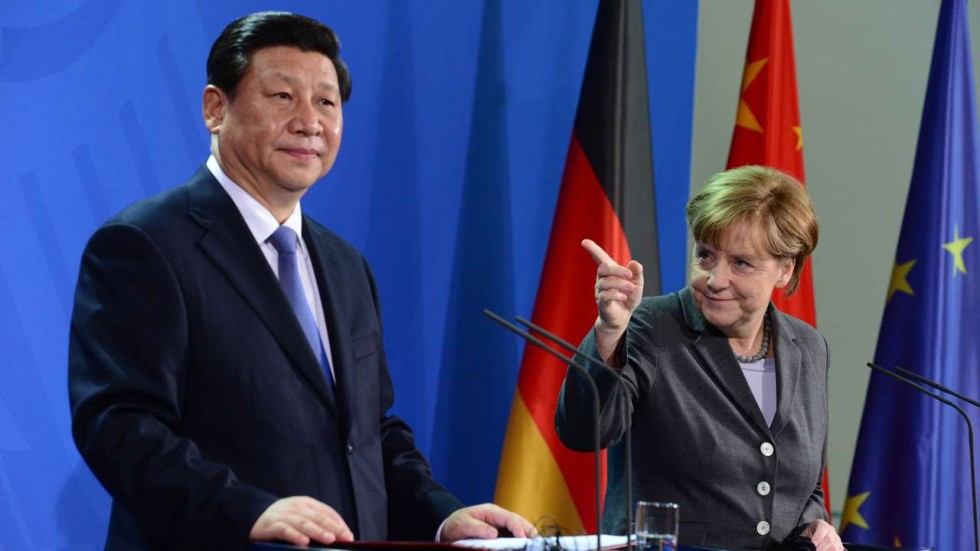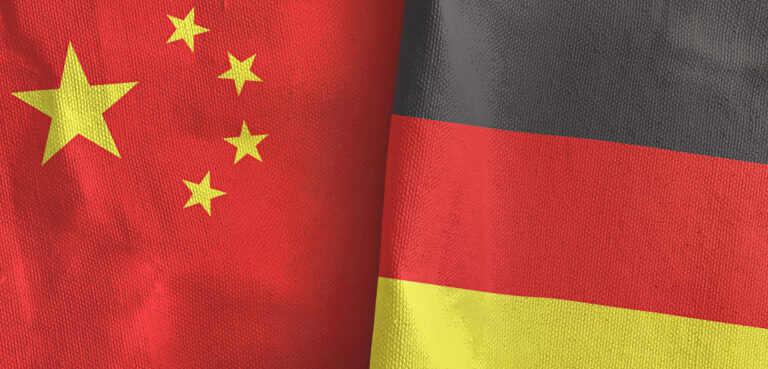How did and how will the Sino-German friendship impact the world?
What did the Sino-German friendship achieve so far?
China and its economy is not only gaining importance – it is becoming world leading. Thus, it is not surprising that China overtook France and the USA for the first time in 2016 as Germany’s largest trading partner. Using the United Nations Database, Daxue determined the overall trade balance between Germany and China in 2016 of US$ 190.6 billion, ahead of the trade balances between Germany and France (US$ 186.6 billion) and the USA (US$ 184.4 billion).
This climax is the last step of a now 45-year-old partnership that started on the 11th of October 1972 and is marked by several milestones over this period.
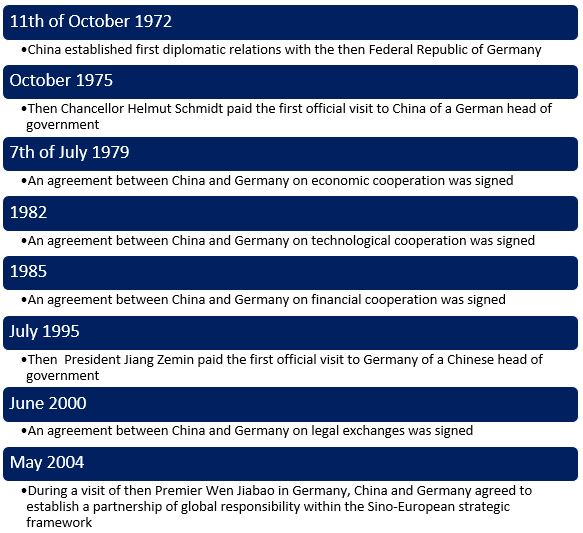
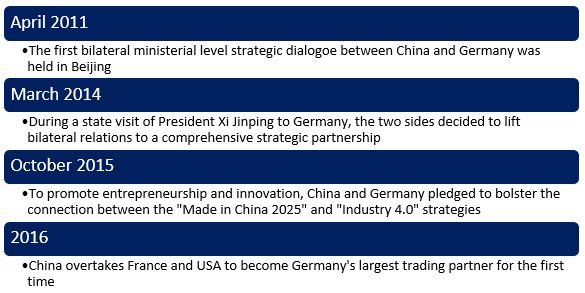
The Milestones of the Sino-German friendship between the establishment of diplomatic relations in 1972 and today; infographic credit: Daxue Consulting.
These milestones show how China first sought in Germany a strategic partner to strengthen its own economy and improve technological, financial and legal standards through signing cooperation agreements in the 1980s. In doing so, during this period, Germany acted more as a helping hand that contributed to China’s outstanding development. For example, since the agreement in 1982 on technical cooperation, China was Germany’s largest recipient of technical development assistance until 2012, with Germany providing a total of US$ 1.21 billion until then, according to the DIE, the German Development Institute.
[ctt template=”2″ link=”pRAYO” via=”yes” ]In 2016, China overtook France and the USA as Germany’s largest trading partner for the first time [/ctt]
However, Germany’s assistance in China’s technical development not only was monetary. As a result of the Sino-German diplomatic relations and China’s growing importance for the world economy and an MNE’s international success, many German companies started businesses in China in the past decades. Thereby, Chinese firms could profit from technology spillovers whenever German companies entered the Chinese market with Joint Ventures (JVs). A successful example would be Volkswagen (大众汽车), the first German car manufacturer going to China, which entered China through JVs with state-owned enterprises and ultimately claimed higher sales volumes in China than in its home country since 2011. Especially technological firms are keen to invest in China. This also show the examples of Siemens (西门子公司), a German conglomerate company, and Bosch (罗伯特·博世公司), leading German engineering and electronics company, which are both very present in China.
Though, as China grew and gained more importance in the world economy over time, this traditional development assistance formally ended in 2010 and was shifted to another level of strategic cooperation to focus on mutual economic benefits and deal with global challenges as well.
The current agenda of China’s and Germany’s close cooperation
Since the last couple of years, the Sino-German friendship is no longer characterized by a guidance of Germany in order to further develop China. The relationship shifted from a recipient-donor model and now is rather about two equally important countries for the world’s economy and political stability which seek to be a role model of strategic cooperation that faces and overcomes global challenges while fostering mutual benefits.
In terms of the current agenda of the Sino-German cooperation, Chinese President Xi Jinping (习近平) stated at the G20 summit in Hamburg, Germany in July 2017: “We need to have an open and innovative cooperation. We want to intensify our cooperation in the areas of trade and economy, finances, and investments but also in the fight against terrorism together.” While the latter is a goal referring to global challenges, the other aspects mentioned by Xi Jinping focus on enhancing the two countries’ positions in the world economy through an open and innovative cooperation. The cornerstone of this desire is the bolstering of the connection between the two strategies “Made in China 2025 (中国制造2025)” and “Industry 4.0”.
Both strategies are designed to comprehensively upgrade the particular industry. While the “Made in China 2025” strategy, published by the Ministry of Industry and Information Technology (MIIT, 中华人民共和国工业和信息化部) in 2015, particularly is designed to transform China from a manufacturing giant to an actual worldwide manufacturing power, the term of “Industry 4.0” nowadays is not solely referred to a German governmental strategy anymore. Originally implemented as the title of a project of the “Forschungsunion”, a research union acting as an innovation counsel for the German government, “Industry 4.0” stands for the intelligent connection of industrial production and modern information and communication technologies.
However, the Sino-German friendship does not only try to enhance the Chinese or German economy and to lead global innovation, the partnership also seeks to overcome global challenges. Thereby, besides the above-mentioned goal of Xi Jinping of fighting the terrorism together, one main goal of China and Germany is to work closely in terms of creating sustainable development in Africa. In May 2017, German Federal Development Minister Gerd Müller traveled to Beijing to discuss ideas for joint projects in Africa. The goals of these Sino-German projects are “creating training opportunities and jobs for young Africans, achieving technology transfer in the field of energy and environmental technologies and establishing a processing sector in Africa in order to improve value capture on the ground”, according to the German Federal Ministry for Economic Cooperation and Development.
Next to the goals of leading worldwide innovation and overcoming global challenges such as terrorism and the poor economic development in Africa, the Sino-German friendship also addresses other sectors.
Sino-German friendship goes beyond the economic aspects
The relationship between China and Germany nowadays is often not only referred to as solely having “diplomatic relations”. It became a friendship. Especially in times, where these two countries drift apart from the USA, China and Germany foster also exchanges other than of economical, technological, financial or legal nature.
Important parts of the friendship are an educational and cultural exchange as well as cooperation in sports, especially football. Indeed, Europe is a popular choice for Chinese students to gain experiences abroad. While the UK is still by far the most popular destination, Germany becomes increasingly a top choice. According to the German Federal Foreign Office, more than 32,000 exchange students from China study in Germany in 2017. Also, around 7,000 German exchange students study in China at one of the more than 120 partner schools.
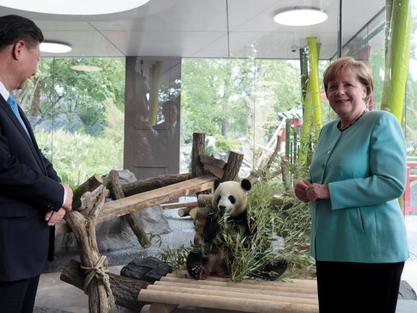
Chinese President Xi Jinping and German Chancellor Angela Merkel at the panda enclosure in Berlin; photo credit: dpa.
In terms of the cultural exchange, the recent transfer of the two pandas MengMeng (梦梦, which can be translated with ‘little dream‘) and Jiao Qing (交情, which means friendship or also ‘little treasure’) from Chengdu (成都) to the Berlin Zoo can be seen as a symbol of the friendly relations. The two pandas are ambassadors for the cultural exchange within this Sino-German friendship as they were already the focus of the media in July 2017 around the G20 summit in Germany, when they arrived in Berlin along with President Xi Jinping to mark the 45th anniversary of the Sino-German friendship this year.
[ctt template=”2″ link=”MB355″ via=”yes” ]Between 1982-2012, Germany provided US$ 1.21 billion for Chinese technological development [/ctt]
Moreover, in November 2016, representatives from German and Chinese football clubs and associations signed an agreement on promoting the football cooperation to support the development of the Chinese football. First results of this cooperation are the first Chinese-German Football Summit that was held in Frankfurt in June 2017, e.g. to discuss the development of trainers and talents, as well as the participation of the Chinese U20 national team in the German fourth division.
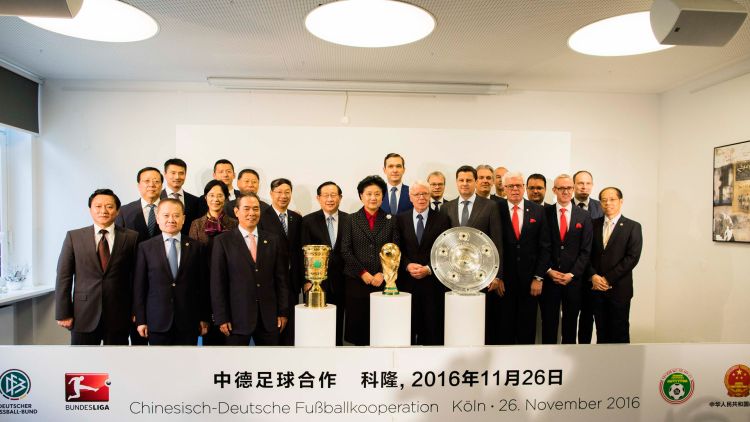
Chinese and German representatives in Köln, Germany signed an agreement in Chinese-German football cooperation in November 2016; photo credit: Bundesliga.
What does the future hold for the Sino-German relations?
Since the establishment of the relations 45 years ago, China and Germany achieved a lot of milestones that helped developing China’s current strong position in the world economy. Moreover, the two nations bound joint projects to tackle global challenges and a friendship arose out of these relations. However, the question is: what will be the next step?
According to German Chancellor Angela Merkel, the next step could be “a fast agreement on investments that one day could lead to a free trade agreement with China.” Whatever the future will actually hold for China’s and Germany’s relationship, it will be interesting to see how it will affect the world.
Daxue Consulting has helped many German companies in China already
“As a consequence of the increasing relations over the past decades, many German companies set up businesses in China,”says Min Chun, senior project manager at Daxue. “By now, more than 8,000 German enterprises operate in China. We helped giants like the financial services provider Allianz or leading home appliances manufacturer Miele with in-depth consumer analyses or market entry projects, for instance,” Chun continues.
Contact us now to discuss your research goals for the Chinese market with our research team and profit from our experiences in helping German companies operating in China.

Min Chun, one of the international and experienced project managers of Daxue Consulting, who already worked with German clients seeking assistance in the unique Chinese market; photo credit: Daxue Consulting.
Follow us on Twitter to discover the Chinese markets:
How innovations in #China will change the world: From Artificial Intelligence to #mpayment https://t.co/Ne76zybkJF pic.twitter.com/ZlvQq7fz7q
— Daxue Consulting (@DaxueConsulting) August 18, 2017


